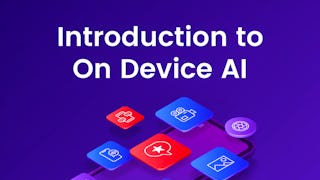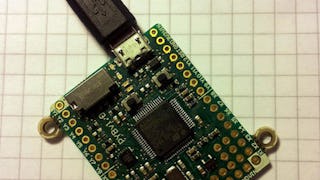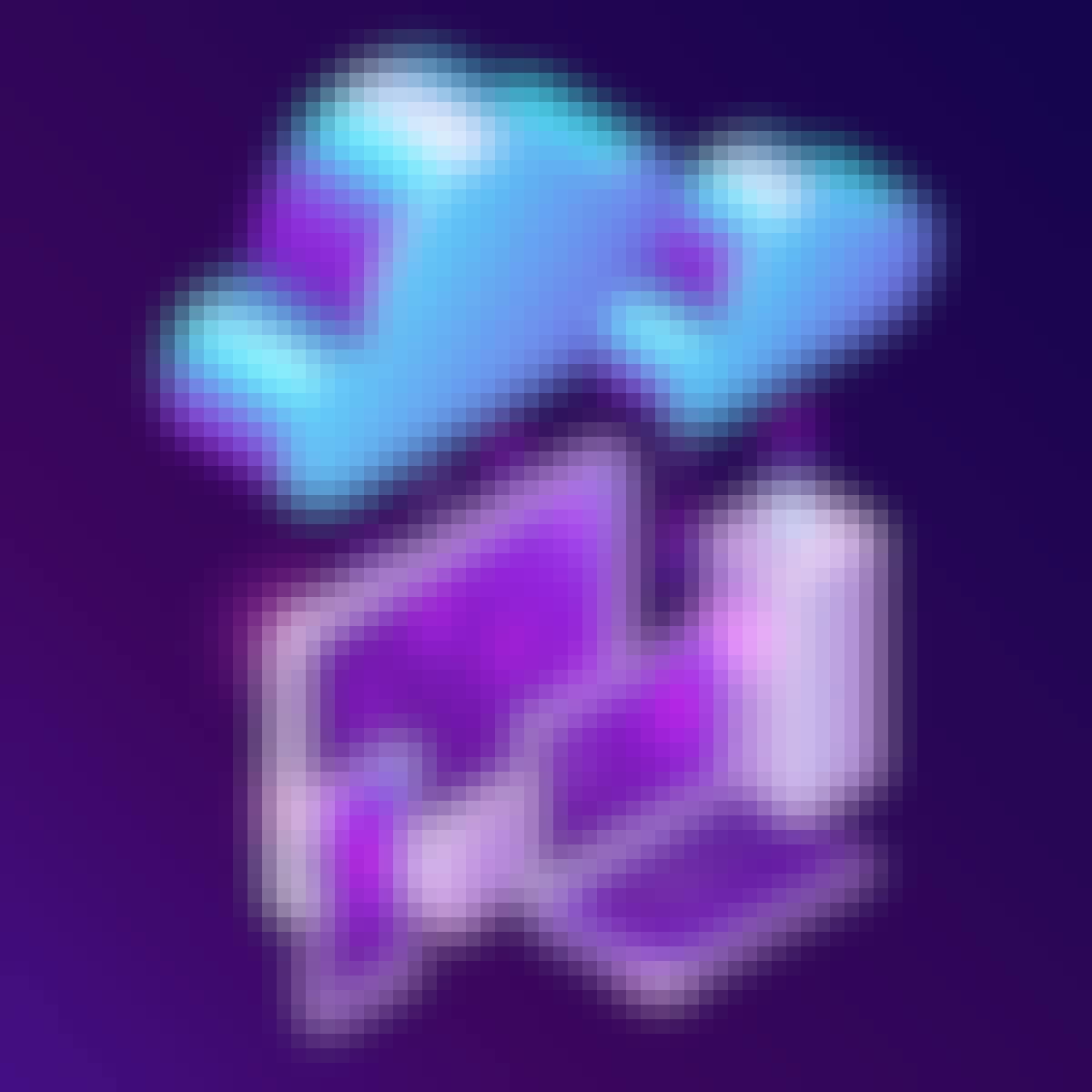- Browse
- Iot
Results for "iot"
 Status: PreviewPreviewI
Status: PreviewPreviewIINSEAD
Skills you'll gain: Agentic systems, Blockchain, Emerging Technologies, AI Security, Healthcare 5.0, AI Enablement, FinTech, Responsible AI, Artificial Intelligence, Generative AI, Internet Of Things, Web Applications, Distributed Computing, Business Ethics, Digital Assets, Data Integrity
4.8·Rating, 4.8 out of 5 stars26 reviewsMixed · Course · 1 - 4 Weeks
 Status: FreeFreeD
Status: FreeFreeDDeepLearning.AI
Skills you'll gain: Model Deployment, Performance Testing, Android Development, Transfer Learning, Image Analysis, PyTorch (Machine Learning Library), Tensorflow, Hardware Architecture, Applied Machine Learning, Artificial Neural Networks, Artificial Intelligence
4.4·Rating, 4.4 out of 5 stars25 reviewsBeginner · Project · Less Than 2 Hours
 Status: Free TrialFree Trial
Status: Free TrialFree TrialSkills you'll gain: Network Security, Virtualization, Augmented and Virtual Reality (AR/VR), Network Administration, Virtual Machines, Cloud Computing, Firewall, Virtual Private Networks (VPN), Mobile Security, Network Troubleshooting, Computer Networking, Cloud Security, Wireless Networks, Peripheral Devices
4.8·Rating, 4.8 out of 5 stars24 reviewsIntermediate · Course · 1 - 3 Months
 Status: PreviewPreview
Status: PreviewPreviewSkills you'll gain: Manufacturing and Production, Automation, Manufacturing Operations, Manufacturing Processes, Production Line, Production Process, Lean Manufacturing, Programmable Logic Controllers, Workforce Development, Robotics, Safety Standards, Safety Assurance, Sustainable Engineering, Sustainable Technologies, Human Machine Interfaces, Artificial Intelligence and Machine Learning (AI/ML), Internet Of Things, Scalability
4.6·Rating, 4.6 out of 5 stars8 reviewsBeginner · Course · 1 - 4 Weeks
 Status: Free TrialFree Trial
Status: Free TrialFree TrialSkills you'll gain: Open Web Application Security Project (OWASP), Mobile Security, Microsoft Intune (Mobile Device Management Software), Network Security, Cybersecurity, Cryptography, Penetration Testing, Intrusion Detection and Prevention, Vulnerability Assessments, Wireless Networks, Encryption, Application Security, Exploitation techniques, Web Applications, Cloud Security, Internet Of Things
4.9·Rating, 4.9 out of 5 stars17 reviewsIntermediate · Course · 1 - 3 Months
 Status: Free TrialFree Trial
Status: Free TrialFree TrialSkills you'll gain: Embedded Systems, Embedded Software, Internet Of Things, Control Systems, Civil Engineering, Electronic Systems, Public Works, Electronic Hardware, Structural Engineering, Energy and Utilities, Maintenance, Repair, and Facility Services, Automation, Integrated Development Environments, Environmental Monitoring, System Monitoring, Continuous Monitoring, Communication Systems, Display Devices, Real Time Data, Peripheral Devices
4·Rating, 4 out of 5 stars9 reviewsIntermediate · Course · 1 - 3 Months
 Status: PreviewPreviewF
Status: PreviewPreviewFFundação Instituto de Administração
Skills you'll gain: Supply Chain Management, Supply Chain, Supply Chain Planning, Logistics, Transportation, Supply Chain, and Logistics, Inventory Management System, Operations Management, Order Management, Business Technologies, Customer Demand Planning, Production Planning, Data-Driven Decision-Making, Automation, Internet Of Things, Blockchain, Machine Learning
5·Rating, 5 out of 5 stars13 reviewsBeginner · Course · 1 - 4 Weeks
 Status: Free TrialFree Trial
Status: Free TrialFree TrialSkills you'll gain: AWS Identity and Access Management (IAM), Amazon CloudWatch, AWS SageMaker, Amazon DynamoDB, Amazon Redshift, Serverless Computing, Amazon Web Services, Identity and Access Management, Amazon S3, AWS CloudFormation, Cloud Management, AWS Kinesis, IT Security Architecture, Infrastructure as Code (IaC), Virtual Networking, Cloud Security, Network Security, Threat Detection, Network Architecture, Containerization
Advanced · Specialization · 3 - 6 Months
 Status: Free TrialFree TrialG
Status: Free TrialFree TrialGGeorgia Institute of Technology
Skills you'll gain: Cloud Applications, Cloud-Native Computing, Cloud Deployment, Application Development, Cloud Management, Cloud Computing, Cloud Infrastructure, Internet Of Things, Application Deployment, Software Development, Distributed Computing, Scalability, Real Time Data
4.5·Rating, 4.5 out of 5 stars19 reviewsMixed · Course · 1 - 3 Months
 Status: Free TrialFree Trial
Status: Free TrialFree TrialSkills you'll gain: IT Security Architecture, Security Controls, Cryptography, Security Engineering, Application Security, Vulnerability Assessments, Information Systems Security, Encryption, Cybersecurity, Hardening, Infrastructure Security, Computer Security, Threat Modeling, Network Security, Public Key Infrastructure, Authentications, Data Integrity
5·Rating, 5 out of 5 stars6 reviewsIntermediate · Course · 1 - 4 Weeks
 Status: Free TrialFree TrialP
Status: Free TrialFree TrialPPearson
Skills you'll gain: Open Web Application Security Project (OWASP), AI Security, Vulnerability Assessments, Distributed Denial-Of-Service (DDoS) Attacks, Network Security, Cryptography, Penetration Testing, Intrusion Detection and Prevention, Cybersecurity, Cyber Security Assessment, Malware Protection, Mobile Security, Threat Modeling, Threat Detection, Encryption, Cloud Security, Web Applications, Internet Of Things, Cloud Computing, Network Architecture
4.6·Rating, 4.6 out of 5 stars17 reviewsIntermediate · Specialization · 1 - 3 Months
 Status: Free TrialFree TrialF
Status: Free TrialFree TrialFFundação Instituto de Administração
Skills you'll gain: Deep Learning, Predictive Analytics, FinTech, Data-Driven Decision-Making, Machine Learning, Digital Transformation, Analytics, Artificial Intelligence, Artificial Neural Networks, Data Science
4.7·Rating, 4.7 out of 5 stars24 reviewsBeginner · Course · 1 - 4 Weeks
In summary, here are 10 of our most popular iot courses
- Generative AI and Blockchain: INSEAD
- Introduction to On-Device AI: DeepLearning.AI
- Advanced Networking, Virtualization, and IT Security: Packt
- Factory Automation: Shaping the Future of Manufacturing : Starweaver
- Advanced Network Attacks, Web Hacking, and Cryptography: Packt
- CPS Design with ARM Core using MicroPython for Industries: L&T EduTech
- Gestão da Cadeia de Suprimentos: Fundação Instituto de Administração
- Exam Prep (SAP-C02): AWS Solutions Architect - Professional: Whizlabs
- Cloud Applications: Georgia Institute of Technology
- Security Architecture and Engineering: Packt










